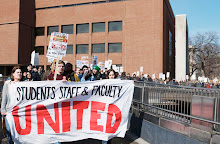The FCC invited the Regents Professors to their April 1st meeting. They had a lot to say. Some choice comments:
"As a DGS, one is seeing the impact of budget cuts and must be concerned about the future of graduate education. They have already taken a 4% cut in their instructional budget, which affects the TA budget, and now must model additional cuts. They only place they can take money is from the same budget because they are not lecturer-rich so that they could offer up those positions. The result is that the TA budget has been hit twice in the same year, which has an impact on what they can do today and tomorrow and on the number of students they can support. Every day is a bad news day, and down the road, one must ask what will happen to graduate education. In addition, the University is in transition, things are up in the air, so programs are difficult to administer."
"Across-the-board cuts are easier than targeted cuts but they do not make sense. There is a need for hard decisions and criteria for determining what is important so that the colleges can decide what departments to support or not support. The 3-5-8% cuts are frustrating because they undercut the quality of the University."
"This group, the Regents Professors, is not hurt like others but they see the impact on their programs. One guest said that students are supported predominantly on RAships in their department. As people think about moving the University forward, they need to think about departments that do not traditionally support graduate students with grant funds because the faculty cannot obtain a lot of grant funding. When the University comes out of this, does it want strong science departments and weak humanities?"
"Professors Gonzales and Oakes reported that they have been pressing the President and Provost for strategic plans and scope of mission discussions and have worked on the fiscal crisis the entire year. They have no idea what the plan is. That is a problem, which is one reason why the Regents Professors were invited to join the Committee today."
"The frustration in CLA with the protocols in place for approving Liberal Education courses (effective for incoming students as of Fall 2010), among a number of CLA department heads as well as faculty, is very high. At worst, the protocols as followed by the Committee on Liberal Education (CLE) have been described by several individuals in various departments as "infantilizing"; chairs have reported their course proposals being sent back repeatedly for revision (if not outright refused), sometimes as many as four or five times, requiring an enormous expenditure of faculty time for what often seems like small return. Fall registration begins in just two weeks. Though CLE has been reviewing courses for a full calendar year, the number of approved courses—required for graduation—remains a fraction of what was available to students under the old system now being phased out. Under the various categories...less than half as many courses as in the past are now listed as approved on the OneStop website. If insufficient numbers of courses are available to students, their graduation will necessarily be delayed, thus disrupting the University's efforts to improve the four-year graduation rate."
"One of the Regents Professors commented...that "it [the budget model] is crazy.""
"One must be concerned about the decline in the sense of the collective and commitment to the University. It is difficult to get buy-in for a University-wide program, and when one cannot get feedback from central administration, one gets the sense that faculty are tolerated on campus, for the work they do, but the administration appears outcomes-oriented and seems not to welcome participation. If the Faculty Consultative Committee cannot make headway, who can? This situation represents a decline in a sense of the University shaped by the faculty, not just one where faculty members are employed by the University."
"In response to a question about whether the presidential transition is a problem, Professor Luepker said he thought it is. A lame-duck president may be in a good position to make decisions, he said, and the University needs decisions now or the next president will be left with a bigger mess. He said he thought the faculty should press hard for decisions now. One Regents Professor said that there is a concern that if nothing except defending the institution is on the table for the incoming president, the situation would invite the administration and new president to do what they want."
"None here would disagree with the proposition that the central purpose of the University is education and intellectual activity. It seems that that central mission has been bled in the last three years for other purposes. One can argue about 3% versus 5% cuts, but the University could get rid of its intercollegiate athletic program, sell the stadium, and let it function on its own. It's also worth asking if the investment in the branding campaign, "Driven to Discover," has contributed anything to the educational mission of the University."
"What will be the faculty participation in the presidential search? [Professor Gonzales explained the interaction between the Committee and the Board of Regents about faculty participation in the presidential search.] One hopes that the Bruininks/Sullivan regime will be gone; the University needs new leadership. It is not getting leadership with the central educational mission at the heart of the concern, so this will be a smaller and weaker university. The effort to strengthen the core mission of the University has been bureaucratized to death because of what the central administration has been preoccupied with, such as the stadium and "Driven to Discover." It is not clear how effective faculty governance is—if this Committee can't get plans out of the administration, who can? The faculty rely on this Committee, which does great work."
"Why can't this Committee get the administration to provide plans? And if not, what should they do? This Committee is the faculty's voice; if it is unable to represent the faculty, other faculty should help. One does one's work knowing that the members of this Committee are doing the hard work of speaking for faculty in governance, for which they are to be thanked. If nothing is getting done, the faculty needs to know that."
"The University is never going to get rid of athletics. The key message from the Regents Professors could be significant: If there is not adequate faculty representation on major committees, including those dealing with budget cuts, the University is in big trouble. Faculty should be at least 60% of the representatives on major committees; the message from this Committee and the Regents Professors could be that without major faculty representation, it will be impossible to avoid having the administration run the institution."
"The faculty are not just employees. The faculty provide the intellectual and pedagogical stuff that makes for a great—or mediocre—university. And it is the faculty, not the administration, that must shape the University. The faculty do the intellectual work that makes this a great university."
"Professor Gonzales mentioned the upcoming "intellectual future" meeting and, in response to a query, explained that twice per year this Committee has a meeting with the President and senior vice presidents devoted to a discussion of the intellectual future of the University. The Committee identifies a theme to guide the discussion. The theme for the next meeting is "How to trim the tree of knowledge: Downsizing the University.""
"Faculty members in general recognize that this is an extraordinary situation. Their parochialism will or must give way to recognizing they are part of a larger community, and that decisions will be required for tough cuts. Faculty voices must be a part of the decisions."
"Professor Chomsky said she endorsed the idea of the Regents Professors speaking. The administration hears from this Committee, with considerable communication in private, and it also hears shriller voices (who complain correctly about concerns like the failure to justify administrative expenses, but aren’t doing so effectively). For the administration to hear directly from the Regents Professors cannot hurt." (Who are you referring to, Prof. Chomsky???)
"The department chairs in one college were informed about the budget cuts and told they nonetheless had the responsibility to retain current student headcounts in order to generate tuition revenue at current levels. The necessary result is larger class sizes, for which, in the 1980s, the University was criticized severely by the legislature. The President’s communication to the University regarding the budget cuts insist that quality will not be sacrificed, which can be read to suggest that the institution has been wasteful, which hardly seems to be the case. At what point do claims about steady-state quality (demonstrably untrue) in the face of repetitive severe cuts become counterproductive (for example, in the eyes of the legislature)? It appears that the University's response is that it will have a lot less and at the same time somehow get better." (yes, there is a Santa Claus...)
Thursday, April 15, 2010
Subscribe to:
Post Comments (Atom)


Perhaps the Faculty Consultative Committee Has to Speak with More Candor to the Board of Regents at Minnesota?
ReplyDeletehttp://bit.ly/cfXOzB